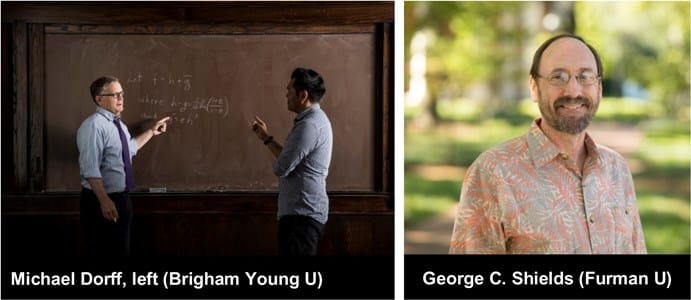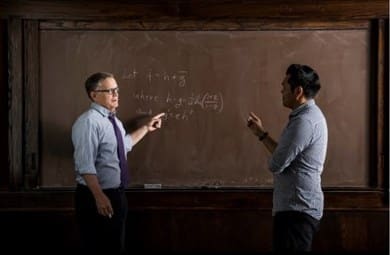Former CUR Board Members Recognized for Their Leadership in Undergraduate Research

Michael Dorff (Brigham Young University) and George C. Shields (Furman University) are the latest Fellows of the Council on Undergraduate Research (CUR) to be honored for their leadership and service as role models for those involved in undergraduate research, scholarship, and creative activities. Every two years, CUR Fellows Awards recognize two CUR members who have facilitated undergraduate research, scholarship, and creative activities at their institution through mentorship and demonstrated leadership activities. Awardees receive a CUR lifetime membership; a plaque; and a Brian Andreen-CUR Student Research Fellowship to support undergraduate research, scholarship, and creative activities on their campus. Dorff and Shields will receive their awards at the 2020 CUR Biennial Conference at Purdue University in June.
“The innovative and collaborative teaching, research, and leadership of Drs. Dorff and Shields embody the very best in undergraduate research mentors,” said Lindsay Currie, CUR’s executive officer. “They provide inspiration to all who nurture and participate in the important work of undergraduate research.”
Mentor of more than 60 undergraduate researchers and recipient of several teaching awards, Michael Dorff is professor of mathematics at BYU, president of the Mathematical Association of America (MAA), and a Fellow of the American Mathematical Society (AMS). He earned his BA in mathematics education from BYU, his MS in mathematics from the University of New Hampshire, and his PhD in mathematics from the University of Kentucky. Dorff held previous faculty positions at University of Missouri–Rolla and Purdue University, and was a visiting Fulbright Scholar at Maria Curie–Skłodowska University in Poland. In 2007, he founded the Center for Undergraduate Research in Mathematics (CURM), which prepares and supports faculty members in mentoring undergraduate researchers—with particular attention to serving diverse students and faculty—and has received more than $2.5 million in grant funding. The center has led to the establishment of similar programs at other higher education institutions, with one colleague commenting, “his work through CURM has created a revolution on our campus.” With Worcester Polytechnic Institute’s Suzanne Weekes, Dorff established the PIC Math program that is funded by the National Science Foundation (NSF) and assists faculty members in teaching a one-semester course where undergraduates solve research problems from business, industry, and government. In addition, he led the Regional Undergraduate Mathematics Conferences program that provided budget and support for more than 150 undergraduate conferences in mathematics across the nation. Initially funded by NSF, the program became self-sustaining through Dorff’s efforts. His past CUR roles include chair of the CUR Mathematics and Computer Sciences Division, divisional representative to the CUR Executive Board, and a member of the CUR-Goldwater Scholars Faculty Mentor Award and CUR Nominations committees. He is a coauthor of the AMS/MAA/CUR book A Mathematician’s Practical Guide to Mentoring Undergraduate Research (2019).
Said Shane Reese, academic vice president at BYU, “As a consistently strong presence in the classroom, Michael Dorff has been an unparalleled advocate for undergraduate research in mathematics at BYU. We are thrilled by his well-deserved recognition as a Council on Undergraduate Research’s Fellow. As a teacher, mentor, and leader in the broader mathematical discipline, Michael is the epitome of student-centeredness in all of his activities. We congratulate him on this honor.”
Mentor to nearly 120 undergraduate researchers and a Fellow of the American Association for the Advancement of Science, George C. Shields is a professor in the Department of Chemistry at Furman University and previously served as vice president of academic affairs and provost at the university. He earned his BS and MS in chemistry from the Georgia Institute of Technology and his PhD in physical chemistry from Georgia Tech. He conducted postdoctoral research at Yale University and the Howard Hughes Medical Institute; held faculty and administrator positions at Armstrong Atlantic State University, Bucknell University, Hamilton College, and Lake Forest College; and was a visiting professor at the University of Barcelona. In 2000, he founded the Molecular Education and Research Consortium in Undergraduate Computational Chemistry (MERCURY), which has provided opportunities for nearly 900 students and 29 faculty members—with substantial participation of underserved populations—to work on computational chemistry research projects as well as share findings at conferences and in published work. As two MERCURY colleagues commented, “[he] has shown us how to become advocates for undergraduate research and use leverage when possible to get research experiences for more undergraduates.” Shields has received more than $5.5 million in grant funding for his research and several honors for his teaching and research. His past CUR roles include representative from the CUR Chemistry Division to the CUR Executive Board, Councilor for the CUR Chemistry Division, and divisional representative to CUR’s Advocacy Advisory Committee.
Said Elizabeth Davis, president of Furman University, “We’re delighted that George has received this special honor recognizing his career-long dedication to championing undergraduate research. He has sparked in students a love for research and inspired so many of them to pursue careers in science. George represents the opportunities Furman strives to provide to all students—engaged and creative learning that prepares graduates for meaningful and consequential lives.”
Founded in 1978, the Council on Undergraduate Research (CUR) focuses on providing high-quality and collaborative undergraduate research, scholarly, and creative activity. Among the many activities and networking opportunities that CUR provides, the organization also offers support for the professional growth of faculty and administrators through expert-designed institutes, conferences, and a wide-range of volunteer positions. The CUR community, made up of nearly 700 institutions and 13,000 individuals, continues to provide a platform for discussion and other resources related to mentoring, connecting, and creating relationships centered around undergraduate research. CUR’s advocacy efforts are also a large portion of its work as they strive to strengthen support for undergraduate research. Its continued growth in connections with representatives, private foundations, government agencies, and campuses world-wide provides value to its members and gives voice to undergraduate research. CUR is committed to inclusivity and diversity in all of its activities and our community.
CUR focuses on giving a voice to undergraduate research with learning through doing. It provides connections to a multitude of campuses and government agencies, all while promoting networking and professional growth to its community.
Brigham Young University provides an outstanding education in an atmosphere consistent with the ideals and principles of its sponsor, The Church of Jesus Christ of Latter-day Saints. Founded in 1875 by Brigham Young, BYU is the largest private religious university in the nation, with more than 30,000 students on campus. The university seeks to develop students of faith, intellect, and character, and to instill habits of lifelong learning and service.
Furman University is a private, undergraduate liberal arts and sciences university of 2,600 students in Greenville, South Carolina. The university is noted for its rigorous academic program and strong faculty, and its 750-acre campus is widely recognized as one of the most beautiful in the nation. At the heart of the university’s academic experience is The Furman Advantage, a strategic plan that combines learning with immersive experiences outside the classroom, creating a personalized pathway that prepares students for lives of purpose, successful careers and community benefit.


